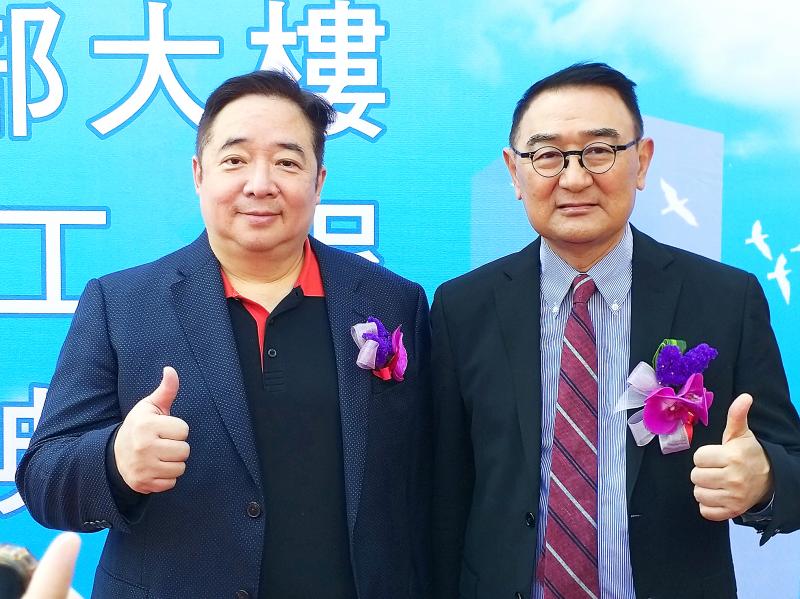Silicon Motion Technology Corp (慧榮科技), the world’s biggest supplier of controllers used in NAND flash memory chips, yesterday said it plans to invest NT$4 billion (US$141.31 million) to build a new headquarters in Hsinchu County’s Jhubei City as chip demand continues to grow.
The NASDAQ-listed company said that it expects robust demand for NAND flash memory chips used in smartphones, PCs and Internet-of-Things (IoT) applications to help fuel growth of its revenue.
Revenue this year is forecast to increase by 20 to 30 percent to US$650 million to US$700 million, from US$539.52 million last year, which was up 17 percent from 2019, Silicon Motion Technology said in a statement.

Photo: Liao Hsieh-ju, Taipei Times
Next year, revenue is predicted to hit US$1 billion, it said.
The 25-story building would be big enough for 1,500 employees when construction finishes in 2024, it said.
Silicon Motion Technology has a global workforce of 1,350, it said.
It would operate a research and development center, and a testing lab at the new facility, while it is also planning to build a facility in Taipei’s Nangang District (南港) via an urban renewable project, the company said.
It expects an unseasonally strong first quarter and an extremely strong order book this year, but sales growth might be capped by foundry supply availability, Silicon Motion president Wallace Kou (苟嘉章) said.
The capacity shortage is expected to carry into next year, as some foundries — such as China’s Semiconductor Manufacturing International Corp (中芯國際) — have scaled back investment in capacity expansion for less advanced 28-nanometer technology, local news firms quoted Kou as saying at a groundbreaking ceremony for the Jhubei headquarters.
To solve this problem, foundries should diversify some resources to expand capacity for matured technologies, rather than investing too much in cutting-edge technologies, he said.
The company is seeing strong, broad-based demand this year for controllers for solid-state drives (SSD), embedded multimedia cards (eMMC) and universal flash storages (UFS), media reported.
This momentum is expected to carry over to next year, Kou said.
PC makers are driving strong demand for SSD controllers, while smartphone and IoT device producers are boosting demand for UFS and eMMC mobile storage controllers, he said.

A proposed 100 percent tariff on chip imports announced by US President Donald Trump could shift more of Taiwan’s semiconductor production overseas, a Taiwan Institute of Economic Research (TIER) researcher said yesterday. Trump’s tariff policy will accelerate the global semiconductor industry’s pace to establish roots in the US, leading to higher supply chain costs and ultimately raising prices of consumer electronics and creating uncertainty for future market demand, Arisa Liu (劉佩真) at the institute’s Taiwan Industry Economics Database said in a telephone interview. Trump’s move signals his intention to "restore the glory of the US semiconductor industry," Liu noted, saying that

On Ireland’s blustery western seaboard, researchers are gleefully flying giant kites — not for fun, but in the hope of generating renewable electricity and sparking a “revolution” in wind energy. “We use a kite to capture the wind and a generator at the bottom of it that captures the power,” said Padraic Doherty of Kitepower, the Dutch firm behind the venture. At its test site in operation since September 2023 near the small town of Bangor Erris, the team transports the vast 60-square-meter kite from a hangar across the lunar-like bogland to a generator. The kite is then attached by a

Foxconn Technology Co (鴻準精密), a metal casing supplier owned by Hon Hai Precision Industry Co (鴻海精密), yesterday announced plans to invest US$1 billion in the US over the next decade as part of its business transformation strategy. The Apple Inc supplier said in a statement that its board approved the investment on Thursday, as part of a transformation strategy focused on precision mold development, smart manufacturing, robotics and advanced automation. The strategy would have a strong emphasis on artificial intelligence (AI), the company added. The company said it aims to build a flexible, intelligent production ecosystem to boost competitiveness and sustainability. Foxconn

Leading Taiwanese bicycle brands Giant Manufacturing Co (巨大機械) and Merida Industry Co (美利達工業) on Sunday said that they have adopted measures to mitigate the impact of the tariff policies of US President Donald Trump’s administration. The US announced at the beginning of this month that it would impose a 20 percent tariff on imported goods made in Taiwan, effective on Thursday last week. The tariff would be added to other pre-existing most-favored-nation duties and industry-specific trade remedy levy, which would bring the overall tariff on Taiwan-made bicycles to between 25.5 percent and 31 percent. However, Giant did not seem too perturbed by the